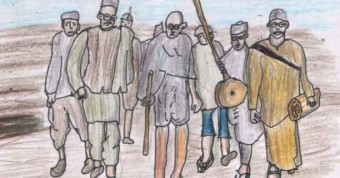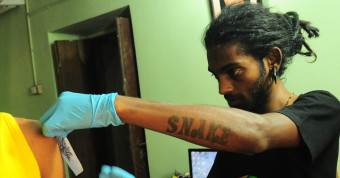Lt.Col. Satish M. Vaidya (Retd)
A Colonel’s Perspective
What does it take to prevent a terror attack on the scale of Bali, Mumbai or Nairobi? How safe are we really, even here in seemingly insulated Goa? To get to the bottom of these and other questions, we approached Lt. Col. Satish M. Vaidya (Retd), who served in the Indian Army’s Parachute Special Forces for 21 years. His experience includes two years in the Indian Peace Keeping Force in Sri Lanka, two years as Instructor in the National Security Guards (Black Cats), some 12 years in Hotel Security, with two years in Six Sigma. He now works as a consultant.
If I were asked if terrorism was likely in Goa, my answer would be ‘no’, considering the current situation.
Would I therefore take security in Goa lightly? Again, my answer would be an emphatic ‘no’. Did anyone expect Pune’s German Bakery blast?
Shortly before the recent fifth anniversary of Mumbai’s 26/11, terrorism again raised its ugly head. Nairobi’s Westgate Mall was caught unawares with arms and ammunition cached by collaborators in a shop. Preventive measures were inconvenient to implement, although known and understood. Merely posting guards may give an illusion of security, but is no deterrent for terrorists. Clearly, terrorism is an irregular form of warfare. We are at the wrong end and must understand terrorists to defeat them.
Terrorism is the use of threats or acts of violence by fanatics fighting for a cause, in order to achieve political aims or to intimidate. An old Chinese proverb calls it ‘killing one to frighten ten thousand’. Terrorist tactics include bombing, taking hostages, kidnapping and killing. Their aim is to spread terror and stretch the security apparatus to the maximum. Terrorists get sustenance from the population. They get shelter, food, transport and most importantly, anonymity. Active supporters collaborate while others are hired without knowing their motive. Terrorists aim to provoke harsh retaliation from security forces, which alienates a section of the population. Security measures cause inconvenience and delay to the general public and are ultimately diluted, to the terrorists’ advantage.
Terrorists use a society’s freedom and openness, its greatest strength, against it. They move freely inside society while aggressively working against it. They use democratic rights to help perpetrate attacks, and also to defend themselves.
When a separatist movement in our country was at its peak, I was posted with an elite anti-terrorist force and travelling in a city bus (alone, in civvies). Two suspicious looking men talked loudly and one narrated a joke about ‘people asking God to save them from militants; and God expressed helplessness as militants troubled even Him (ha ha ha…)’. The passengers were the intended audience for this innocuous joke. This was psychological terrorism, but not an offence.
A few days after the Ghatkopar bus bomb blast in Mumbai, I was travelling in a B.E.S.T. bus and listening to the radio on my ear-phones. As I adjusted them to hear the news better, one man sitting behind the driver on the rearward facing seat thought I was tracking him, dropped a small cloth bag under the seat and left the bus at a traffic signal. No one else noticed this but my conditioned response was to get the bag out of the bus immediately. Its contents felt like fine gravel. I called out to the man and threw the bag to a roadside hawker. This culprit walked away briskly but sneakily looked back and then took away the bag. The police later told me that he was a courier-boy and I had thrown away diamonds worth over Rupees One Crore.
Another time, a bag was abandoned in the lounge of the hotel where I was working. The group of men who left it had a small outstanding bill and the staff had been waiting for them. Knowing that an abandoned bag could be a bomb, the matter was reported when they did not return. The CCTV recording showed the group in a vigorous discussion when moving out of the hotel. The bag did not seem to be surreptitiously left behind, hence it was unlikely to contain a bomb. We opened it at a safe place outside the building and found in it a lot of cash and some business cards that helped locate the owner.
Preventing and countering a terrorist attack is like a complex jigsaw puzzle that requires good team-work. Physical security is a small (but critical) part of the defensive mechanism. Trained personnel operate tools such as metal and explosive detectors, X-ray baggage scanners and a CCTV system. Israelis have effective checks to detect weapons/intentions well in time and as far away from a public location as possible, which puts people at ease through discrete, unobtrusive and low-key security measures within the premises. Security personnel are often engaged in a monotonous and thankless task of detecting hazards. In case of a false positive, where a threat is wrongly indicated as present, security personnel who are expected to take action as if the threat was real may be berated by someone taking offence.
Let me tell you a story about the VIP Syndrome. Nittu, a huge mountain dog was our Regimental Police mascot and stayed at the Main Gate. As Second-in-Command, I moved around the unit on a bicycle. Cyclists normally dismounted at the gate, but the sentry made an exception for me by opening it before I reached and I cycled on without dismounting (this rule didn’t apply to me as I was one of the bosses). Nittu, who was dozing nearby saw this and charged at me with a low menacing growl, opened her huge jaws wide to encompass my ankle with her teeth and snapped at me just a hairbreadth away, which stopped me dead in my tracks. The sentry came running and dragged her away, scolding her for not recognising ‘2 I/C sahib’. I stopped him, as I had broken the rule as Nittu understood it.
Most people suffer from information overload. They might be engrossed in mobile phones (or their own thoughts) and are completely tuned out in public places. Situational awareness is necessary for people to see potential threats before and as they develop; and enables potential victims take proactive measures to avoid danger and alert authorities. Apathy, denial or complacency can be deadly and reduces chances of recognizing and avoiding the threat.
Terrorists often select a high value, vulnerable target after recce and surveillance (as David Headley did for the 26/11 Mumbai attack). They may leave bags unattended to gauge the response; just like Readers’ Digest dropped wallets with cash in cities around the world to compare their levels of honesty. Terrorists also consider the target population and media attention they would get.
Security must be ‘by design and not by default’. Because there has been no attack so far in Goa, we cannot assume there won’t be. Just ask the survivors of Westgate.
Indian Mujahideen co-founder 30 year old Yasin Bhatkal, arrested along Indo-Nepal border on August 29, is alleged to be involved in a series of blasts from 2006 onwards across the country. He was brought to Goa by the National Investigation Agency (NIA) on September 16 to probe his links in the state.
The team took Bhatkal to places like Anjuna beach, Mapusa, Panjim and Vasco, which he had reportedly visited in the past 10 years. It is likely that Bhatkal had been recruiting gullible youth from Goa into his terror network.
Goa, which attracts 25 lakh tourists annually, was on alert last year following inputs that it may be on the hit list of terrorists.
Bhatkal, who co-founded Indian Mujahideen (IM) in 2008 along with brother Riaz, is also wanted in the German Bakery bomb blast case in Pune. The blast, that took place on February 13, 2010, left 17 people dead. The IM was designated a terrorist group by the Government under the Unlawful Activities Prevention Act in June that year.




